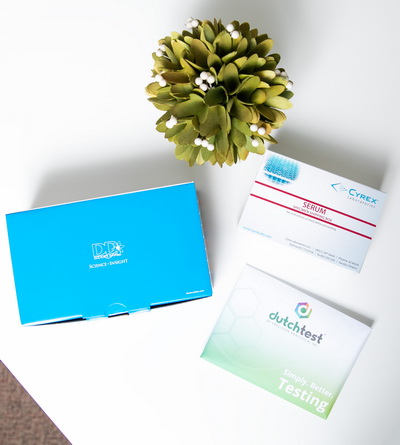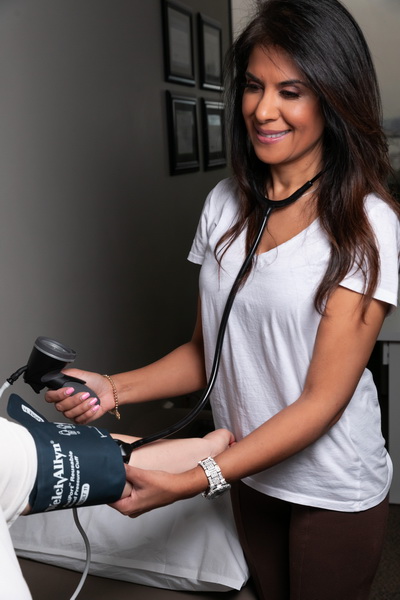

PCOS and Hyperandrogen Syndrome:
If you are experiencing irregular menstrual periods, missed periods, unwanted facial or body hair, acne along your jawline, difficulties losing weight or anxiety, elevated androgens may be one of the root causes of your symptoms.
A diagnosis of Polycystic Ovary Syndrome (PCOS) may be confusing. Or you may have all of the symptoms of Polycystic Ovary but are told your hormones are okay.
Lets discuss PCOS and hyperandrogen syndrome in more detail.
What is Hyperandrogen Syndrome?
Hyperandrogen syndrome occurs when your body produces high levels of Androgens. This includes DHEA and Testosterone. When a female makes higher levels of androgens in her body, this can result in symptoms such as excessive hair growth including facial hair, menstrual irregularities and missed periods, acne and male pattern hair loss (thinning of hair on the crown of the head or alopecia)
PCOS is defined as an elevated production of androgens from the ovaries. It is the most common cause of Hyperandrogenism (1) However, you can have elevated androgens and not have PCOS. You can also have hyperandrogenic symptoms but normal androgen levels. Or elevated androgens on a blood test but no symptoms. It is important to discuss your symptoms with your doctor, as hyperandrogenism can occur due to other conditions.
What is Polycystic Ovary Syndrome
Polycystic ovarian syndrome (PCOS) affects about 1 in 10 women of reproductive age. Approximately 1.4 million women in Canada may have PCOS (2). Women with this condition often present with enlarged ovaries containing numerous small cysts along the outer edge of the ovary, giving the ovaries a polycystic appearance. While doctors don’t know the exact cause of PCOS, several factors are believed to play a role, including excess insulin, low-grade inflammation, dysregulation of the hypothalamic-ovarian axis and genetics.
PCOS is not a disease. It is a cluster of symptoms due to increased production of androgens (DHEA-s and Testosterone) This results in problems with ovulation and the symptoms women experience such as excessive hair growth ( hirsutism) and missed periods.
Symptoms of a Hormone Imbalance
PCOS symptoms can greatly vary from patient to patient. Not every woman with PCOS will have all the symptoms of PCOS. Symptoms may also change depending on how you are managing your PCOS. They may also change depending on your diet and stress levels.
Symptoms of PCOS include:
How is PCOS diagnosed?
There is no single test to diagnose PCOS. The Rotterdam Criteria is commonly used to diagnose PCOS.
Based on the Rotterdam Criteria, you must have 2 of the following 3 criteria to be diagnosed with PCOS. Other causes of elevated androgens must also be ruled out.
Oligo- or an-ovulation is generally defined as delayed cycle length (greater than 35 days) between periods or no periods due to difficulties with ovulation. Elevated androgens and insulin can halt the development of follicles ( or growing eggs) in the ovaries. Ovulation may be delayed or you may not ovulate at all. Managing androgens and insulin in your body is one of the main goals in the treatment of PCOS.
LABORATORY TESTING IN PCOS
A comprehensive assessment and treatment approach may include hormone and metabolic tests. Your Naturopathic Physician at Vitalia Health Care INC will discuss testing options with you and make her recommendations based on your initial consultation.

Testing may include:
- -free testosterone, total testosterone
- -DHEA-s
- -Estrogen, progesterone, LH, FSH
- -17 OH progesterone
- -fasting insulin, fasting blood glucose, HBA1C
- -am cortisol
- -prolactin
- -TSH
- -cholesterol panel
- -Dried Urine Hormone Test
INSULIN AND PCOS
Insulin is a hormone produced by the pancreas. It allows glucose from the bloodstream to enter cells and be used to produce energy. Insulin resistance (IR) occurs when your cells do not respond properly to insulin. Insulin resistance develops over time. A diet high in sugar and refined carbohydrates can lead to Insulin resistance. The result is higher levels of glucose in the blood and an increased risk of developing Type 2 Diabetes.
In women who are genetically susceptible to PCOS, excess insulin can cause the body to produce more androgens. Women who are overweight have a higher risk of having Insulin resistance which may drive their PCOS symptoms. Too much insulin can cause the ovaries to produce too much Testosterone. This can make PCOS symptoms worse including missed periods, increased facial hair, increased anxiety and weight gain.
Increased insulin and IR usually develop over time from eating a diet high in sugar and refined carbohydrate such as white pasta, bread and baked goods. However, IR may also develop with a healthy diet. Having PCOS may increase your risk of developing IR, even with a healthy diet. Your Naturopathic Physician at Vitalia Health Care will assess your blood sugars through a comprehensive initial assessment and laboratory testing . From this assessment, she will develop a treatment plan to manage your insulin and blood sugars. This will include diet/lifestyle recommendations and may include supplements or medications.
ADRENALS AND PCOS
Your adrenal glands produce hormones. When you are stressed, your adrenal glands produce cortisol and adrenaline. In women with PCOS, chronic stress leads to the increase of DHEA-s from the adrenal glands.
DHEA-s is an androgen. It causes the same hyperandrogen symptoms as PCOS. There is a link between stress and androgen excess. So stress can be a driver of Polycystic ovarian syndrome symptoms (so called Adrenal-PCOS) (4)
If you experience high amounts of stress, feel overwhelmed, crave salt and feel dizzy when you stand up and have elevated DHEA-s on a blood test, Stress may be driving your PCOS symptoms.
The focus of treating adrenal PCOS is to lower stress, balance cortisol and lower DHEA-s. Your Naturopathic Physician at Vitalia Health Care INC can assess your adrenal health. This may include a 24 hour cortisol test ( assessed by urine or saliva) and testing for DHEA-s levels by a blood test.
INFLAMMATION AND PCOS
PCOS is characterized by chronic, low grade inflammation (5) Chronic inflammation may be a driver of PCOS symptoms. Hyperandrogenism contributes to chronic inflammation.
Symptoms that may indicate inflammation may be contributing to your PCOS symptoms include:
Chronic inflammation can contribute to Insulin resistance, elevated androgens and the symptoms of Polycystic ovarian syndrome (6)
Your Naturopathic Physician at Vitalia Health Care INC may suggest certain tests to assess inflammation in your body. Reducing inflammation is an important part of the management of Polycystic ovarian syndrome . Your Naturopathic Physician will discuss diet and lifestyle recommendations to reduce inflammation. She may also discuss supplements and medications.
Digestion and Polycystic Ovarian Syndrome
Women with PCOS are twice as likely to have Irritable Bowel Syndrome ( IBS) than women who do not have PCOS (6) This can further contribute to the inflammation commonly seen in women with Polycystic ovarian syndrome.
A comprehensive assessment of digestive health to assess the gut microbiome, assess for leaky gut, assess for histamine intolerance and fatty liver disease may all be important in the management of PCOS.
If you have PCOS, discuss your digestive health with your Vancouver Naturopathic Doctors at Vitalia Health Care. Assessment and treatment of digestive disorders is beneficial in reducing inflammation and in reducing PCOS symptoms.
NATUROPATHIC TREATMENT OPTIONS
Polycystic Ovary Syndrome is a hormonal and metabolic condition that currently has no cure. The focus of treatment is on managing symptoms and reducing the progression of related metabolic issues.
Women with high levels of androgens are at a higher risk of developing diabetes and cardiovascular disease as they get older. Effective management of PCOS aims to lower insulin and androgen levels while also balancing cortisol through stress management.
PCOS Treatment Goals
1. Normalize Insulin Levels
Elevated insulin and insulin resistance (IR) can exacerbate PCOS symptoms, affecting approximately 60-70% of women with the condition. (7) High insulin levels and IR can drive the progression of PCOS.
To address these issues, treatment strategies focus on reducing insulin and managing IR through diet, weight loss, supplements, and/or prescription medications. Your Naturopathic Physician at Vitalia Health Care Inc. will discuss personalized treatment options based on your insulin and blood sugar levels.
2. Reduce Androgens including Testosterone & DHEA-s

Androgens, such as testosterone and DHEA-s, are produced by both the ovaries and adrenal glands. To lower androgen levels, treatment strategies may include dietary and lifestyle changes, supplements, and/or prescription medications.
It's important to note that DHEA-s is produced by the adrenal glands, which can become overactive during times of stress. When stressed, the adrenal glands release both cortisol (a stress hormone) and DHEA-s, leading to symptoms often associated with PCOS, such as water retention, blood sugar regulation issues, episodes of hypoglycemia, excess facial and body hair, acne, and difficulties managing stress.
Your Naturopathic Physician at Vitalia Health Care will evaluate your overall health, focusing on both ovarian and adrenal function. She will recommend treatments designed to support your adrenal glands and help lower androgen levels.
3. Regulate ovulation and improve progesterone levels
Progesterone is produced in the ovaries during ovulation. Elevated androgens can delay or prevent ovulation. Therefore, reducing androgens is an important part of supporting normal ovulation in a women with PCOS. Treatment strategies often include diet recommendations, stress reduction and supplements or medications aimed at lowering androgens and promoting ovulation.
Women with PCOS may also have elevated luteinizing hormone (LH) levels, which can further stimulate androgen production and hinder ovulation (8). Some may benefit from the cyclic use of bio-identical progesterone, which can help lower LH surges that contribute to elevated androgens and irregular ovulation. Your Naturopathic Physician may prescribe progesterone for the second half of your menstrual cycle or for a specific 14-day period each month.
4. Improve cortisol levels
Chronic or acute stress can lead to elevated cortisol and androgen production from the adrenal glands, making stress management a key component of PCOS treatment. There are various techniques to help manage stress, including prioritizing sleep, reducing screen time, practicing breathing exercises, engaging in meditation, using relaxation apps, laughing, exercising, and exploring grounding therapies or counseling. Since everyone is different, it's important to find the strategies that work best for you. Additionally, supplements and medications may also provide support in managing cortisol levels.
DIET RECOMMENDATIONS
Insulin resistance is very common in PCOS, so it's important to reduce sugar and processed carbohydrates when managing its symptoms. Based on your initial assessment and blood test results, your Naturopathic Physician at Vitalia Health Care will provide personalized diet and nutrition recommendations. Early diagnosis, combined with an improved diet and lifestyle, can enhance the quality of life, alleviate PCOS symptoms, and lower long-term health risks associated with elevated androgens. (9)
Studies suggest that a balanced diet consisting of approximately 40% carbohydrates, 30% healthy fats, and 30% protein, along with regular exercise, may help reduce PCOS symptoms and improve metabolic balance.(10)
Good options for carbohydrates include
Good options for protein include
Good options for fats include
We do not generally recommend completely avoiding carbohydrates. They are necessary for ovulation, mood stabilization, improved sleep, and stress management. Completely avoiding carbohydrates may lead to increased stress, fatigue, and might affect ovulation. For women practicing intermittent fasting, we advise not fasting for more than 12 or 13 hours. Your Naturopathic Physician will discuss specific diet recommendations with you during your appointment.
The Naturopathic Physicians at Vitalia Health Care INC are experienced in the natural management of PCOS.
Book your appointment here
SUPPLEMENT RECOMMENDATIONS
The medical management of PCOS may include prescription medications such as metformin. Some women experience side effects with metformin, and there is mixed results of how well it works in PCOS women without insulin resistance (11)
Supplements may be effective in reducing the symptoms of PCOS without causing side effects. Your Naturopathic Physician may suggest specific supplements that could benefit you in managing PCOS. Schedule your appointment today to find out more.
Book hereSupplements that may beneficial in treating PCOS include:
Inositol
Two forms of Inositol that have been studied in PCOS are myoinositol and D-chiro-inositol. Inositol is a safe, sugar molecule. Both forms of inositol has been shown to improve egg quality Ref, improve insulin sensitivity and reduce androgens. (12)
Anti-androgens:
Supplements that have anti-androgen effects and may be helpful in reducing the symptoms of PCOS include Saw Palmetto, Red-reishi, Licorice, Chinese peony and Spearmint tea (13). Your Naturopathic Physician at Vitalia Health Care INC will discuss what supplements may be beneficial for you.
Vitamin D:
Studies indicates that vitamin D deficiency may be a significant factor in developing insulin resistance and metabolic syndrome in women with PCOS. Women with PCOS have higher rates of Vitamin D deficiency (67-85%). Having lower levels of Vitamin D may also be a factor in the development of co-existing conditions with PCOS. These include insulin resistance, Type 2 diabetes, Cardiovascular disease and metabolic syndrome. (14) Your Naturopathic Physician at Vitalia Health Care may recommend Vitamin D, based on your initial assessment.
Coenzyme Q10
Coenzyme Q10 is an antioxidant. Studies show Coq10 may be helpful in reducing inflammation seen in PCOS patients. These include a reduction in liver enzymes and inflammatory markers. As discussed above, inflammation may drive PCOS symptoms and make them worse. CoQ10 may be beneficial in reducing inflammation and improving PCOS symptoms.
Coenzyme Q10 (CoQ10) is a potent antioxidant. Research indicates that CoQ10 may help reduce inflammation in PCOS patients by lowering liver enzymes and inflammatory markers. As previously mentioned, inflammation can drive PCOS symptoms and make them worse. CoQ10 may be beneficial in reducing inflammation and improving PCOS symptoms.(15)
Please DO NOT start any new supplement program until you have discussed this with your Naturopathic or Medical doctor as they may not be appropriate for you.
Polycystic Ovary and Hyperandrogen Syndrome is a metabolic condition that requires a comprehensive approach for effective management. This includes dietary recommendations, lifestyle and stress management, beneficial supplements, and, in some cases, prescription medications.
Since each person is unique, the approach to managing PCOS is tailored specifically to you! The first step is to schedule an initial consultation with one of our Naturopathic Physicians. During this consultation, your Naturopathic Physician will learn about your health history, perform appropriate physical examination and may discuss laboratory testing with you. Based on this information, your Naturopathic Physician will develop a personalized treatment plan that embraces a whole-body, functional medicine approach. Book your appointment today! Check out their availability HERE!
How do I book an appointment?

The easiest way to book an appointment is on-line. Please see our availability here. We accept both in-person and virtual appointments.
We are also available for assistance at our Vancouver Clinic by calling 604-566-9355. You can also email us at info at vitaliahealthcare.ca if you have any questions or require further information.
What to expect during your initial appointment
During your initial appointment, your Naturopathic Physician will review your current health history, symptoms, family history, and any other pertinent information. If you have previous lab results from your doctor or another healthcare provider, please bring them along for review.
Based on the information gathered during this appointment, your Naturopathic Physician will develop the first step in your treatment plan. This may include diagnostic testing including hormone testing, as well as diet, nutrition, lifestyle, and supplement suggestions. Your Naturopathic Doctor will discuss these recommendations with you in detail.
What to expect during your follow up appointment
At your follow-up appointment, any laboratory tests results received will be reviewed. We'll also discuss your progress based on the recommendations given during your initial appointment. Additionally, more specific diet and supplement recommendations or prescription medications may be made based on your test results and the guidance from your Naturopathic Physician.
What is the cost of the appointment?
The first initial appointment is $225. The follow up appointments are $125. Brief appointments are $65.
Do I have to be on prescription medications or birth control to manage my PCOS?
There is no one-size-fits-all answer to this question. Many women successfully manage their PCOS symptoms, such as unwanted hair growth, acne, and blood sugar issues, through dietary, lifestyle, and supplement recommendations. These changes can be very effective at controlling symptoms. However, some women may benefit from adding a low-dose prescription medication, such as spironolactone. Your Naturopathic Physician will discuss your options and provide personalized recommendations during your appointment.
Which Naturopathic Physicians are available for appointments regarding PCOS treatment?
Dr Tasreen Alibhai ND, Dr Farnoush Salimy ND, and Dr Elizabeth Miller ND are trained and experienced in the naturopathic management of PCOS. They are licensed by the College of Naturopathic Physicians of BC and authorized to prescribe medications in BC.
Check out their availability HERE
Dr Alibhai, ND
FAQ
During the initial appointment, your Naturopathic Physician will review your health history, hormone symptom history, family history and any other information pertinent to developing the right treatment plan for you.
At this time, laboratory testing will be discussed. Some basic diet and herbal recommendations may also be discussed.
Polycystic ovarian syndrome (PCOS) affects between six and 10 percent of all women. This common hormonal disorder is most often diagnosed in women of reproductive age. Women with this condition often present with enlarged ovaries containing numerous small cysts along the outer edge of the ovary, giving the ovaries a polycystic appearance. While doctors don’t know the exact cause of PCOS, several factors are believed to play a role, including excess insulin, low-grade inflammation and genetics.
PCOS can develop anytime between adolescence and post-menopause; however, symptoms can greatly vary from patient to patient. Studies show that about 60 percent of women with PCOS are overweight or obese and a majority of these women have abnormally high levels of androgens, or male hormones. Insulin resistance is also thought to play a major role in polycystic ovary syndrome. Other symptoms of PCOS include: Infertility, Ovarian cysts, Irregular, infrequent or absent menstrual periods, Oily or acne skin, Hirsutism, or increased hair growth, Obesity or weight gain, Dark, thick patches of skin, thinning hair or male-pattern baldness, Pelvic pain, Skin tags, Sleep apnea, Hot flashes, PMS, Low Libido, Night sweats, Endometriosis, Foggy Memory, Vaginal dryness, Fibrosis, Depression or anxiety
Since there is no cure for PCOS, the condition must be properly managed to prevent future health problems. Your individual treatment will primarily depend on your symptoms and whether or not you desire to become pregnant. Some women may require a combination of treatments to meet their specific goals. At their Vancouver clinic, Vitalia Health Care offers a variety of natural Treatment for women with PCOS, including the following: Bio-Identical Natural Hormone Replacement and Nutrition and Dietary Counseling. For more information regarding natural treatment for women with PCOS, or to learn more about any other treatments and services available at Vitalia Health Care in Vancouver, call 1-604-566-WELL (9355).

